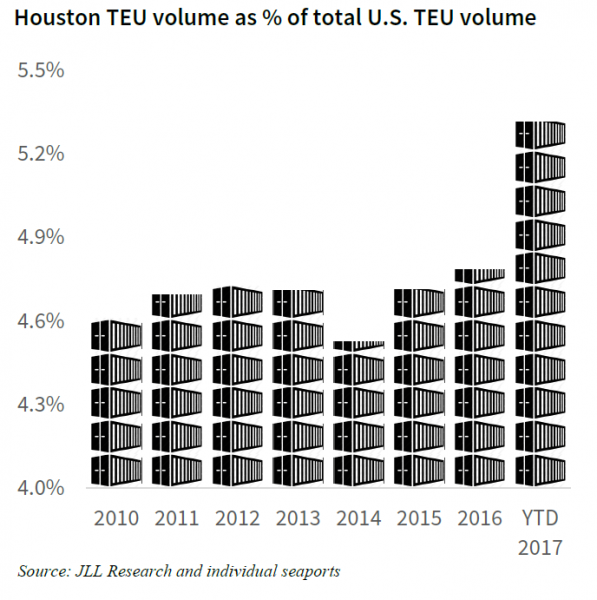Port Houston joins blockchain pilot program to digitize the supply chain
Port Houston is the first port to participate in a pilot program led by IBM and Danish shipper Maersk which aims to commercialize blockchain technology in the global oil, gas and petrochemical supply chain.

A blockchain solution from IBM and Maersk will help manage and track the paper trail of tens of millions of shipping containers across the world by digitizing the supply chain process from end-to-end to enhance transparency and secure sharing of information among trading partners.
Blockchain is the shared accounting ledgers made famous by Bitcoin.
The as-yet unnamed venture between IBM and Maersk intends to help shippers, ports, customs offices, banks, chemical and product manufacturers and other stakeholders in global supply chains track freight as well as replace related paperwork with tamper-resistant digital records.
When adopted at scale, the solution has the potential to save the industry billions of dollars, IBM said.
“The projects we are doing with IBM aim at exploring a disruptive technology such as blockchain to solve real customer problems and create new innovative business models for the entire industry,” said Ibrahim Gokcen, chief digital officer, Maersk in a statement.
Port Houston
Port Houston will be the first port in the U.S. to join in the Maersk IBM blockchain pilot program, a partnership that positions it to bring the power of cryptocurrency to the sector.
“Ports are critical links in the supply chain and creating more visibility of information to our customers and users of Port Houston facilities only enhances the efficiency of the movement of cargo,” Port Houston Executive Director Roger Guenther said.
“We are excited to be the port chosen to be a part of this pilot project and have begun to preliminary test the exchange of information through this technology during the initial phase,” Guenther said.
Port Houston joins other blockchain players such as Dow DuPont, Petroteq, Riot Blockchain, Marathon Patent Group, and Wipro Limited. Major downstream consumers such as General Motors and Procter and Gamble are exploring ways to use the technology to streamline record-keeping for their supply chains as well, IBM said in a statement.
Export growth
With $129 billion in shipments, Texas is the largest chemical producing state in the U.S. according to the American Chemistry Council (ACC).
Meanwhile, Port Houston is at the center of a major export tsunami taking place on the U.S. Gulf and has been investing millions in infrastructure, services and innovation, port officials told Petrochemical Update.
Port Houston facilities reached the highest total tonnage in Port history of 38.3m tons in 2017, surpassing the previous record of 37.8m tons set in 2014.
It was also a record-setting year for container business. Port Houston handled 2.46 Million TEU for 2017; the previous record was set in 2016 with a volume of 2.18m TEUs (nearly a 13% increase year over year).

“Port Houston is the right place to handle this export of resins that is primarily originated here. Our goals as supply chain professionals is to look at cost and streamlining that supply chain, making it agile and getting that product moving,” said John Moseley, Senior Director, Trade Development at Port of Houston Authority.
Moseley was speaking at the Petrochemical Update Supply Chain conference.
Port Houston has invested $1 billion over the last five years to develop infrastructure to handle growth. Another $200 million is earmarked over the next two years to handle future growth.
Innovative solution
As exports from the U.S. accelerate, international trading parties are requesting both improved workflow and better visibility.
“Traceability and transparency are some of the most important foundations of logistics,” Guenther said.
A single vessel can carry thousands of shipments, and on top of the costs to move the paperwork, the documentation to support it can be delayed, lost or misplaced, leading to further complications.
Maersk found in 2014 that just a simple shipment of refrigerated goods from East Africa to Europe can go through nearly 30 people and organizations, including more than 200 different interactions and communications among them.
A blockchain application in logistics is centered on creating a digital distributed ledger to create a single electronic place where the myriad of shipment documents are housed.
The shared ledger is updated and validated in real time with each network participant; enabling equal visibility of the shipment activities in real time including the location, ownership, and condition of the freight.
How it works
Blockchain, an immutable, security rich and transparent shared network, provides each participant end-to-end visibility based on their level of permission.
Each participant in a supply chain ecosystem can view the progress of goods through the supply chain, understanding where a container is in transit. They can also see the status of customs documents, or view bills of lading and other data.
No one party can modify, delete or even append any record without the consensus from others on the network.
According to IBM, this level of transparency helps reduce fraud and errors, reduce the time products spend in the transit and shipping process, improve inventory management and ultimately reduce waste and cost.
“We believe that this new supply chain solution will be a transformative technology with the potential to completely disrupt and change the way global trade is done,” Bridget van Kralingen, senior vice president, Industry Platforms, IBM said in a statement.
The solution developed by Maersk and IBM is based on the open source Linux Foundation's open source Hyperledger Fabric. IBM hosts the solution on the IBM Cloud and the IBM high-security business network, delivered via IBM Bluemix.
The solution is expected to be widely available to support multiple parties across the ocean shipping industry ecosystem later this year, IBM said.
By Heather Doyle
